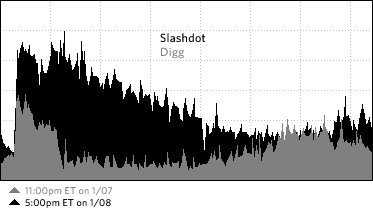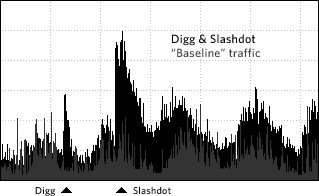Digg vs. Slashdot (or, traffic vs. influence)
There’s been lots of talk on the web lately about Digg being the new Slashdot. Two months ago, a Digg reader noted that according to Alexa, Digg’s traffic was catching up to that of Slashdot, even though Slashdot has been around for several years and Digg is just over a year old. The brash newcomer vs. the reigning champ, an intriguing matchup.
Last weekend, a piece on kottke.org (50 Fun Things to Do With Your iPod) was featured on Digg and Slashdot[1] and the experience left behind some data that presents a interesting comparison to the Alexa data.
On 1/7 at around 11:00pm ET (a Saturday night), the 50 Things/iPod link appeared on Digg’s front page. It’s unclear exactly what time the link fell off the front page, but from the traffic pattern on my server, it looks like it lasted until around 2am Sunday night (about 3 hours). As of 10pm ET on 1/11, the story had been “dugg” 1387 times[2], garnered 65 comments, and had sent ~20,000 people to kottke.org.
On 1/8 at around 5pm ET (a Sunday afternoon), the 50 Things/iPod link appeared on Slashdot’s front page and was up there for around 24 hours. As of 10pm ET on 1/11, the story has elicited 254 comments and sent ~84,100 people to kottke.org.
Here’s a graph of my server’s traffic (technically, it’s a graph of the bandwidth out in megabits/second) during the Digg and Slashdot events. I’ve overlaid the Digg trend on the Slashdot one so you can directly compare them:

That’s roughly 18 hours of data…and the scales of the two trends are the same. Here’s a graph that shows the two events together on the same trend, along with a “baseline” traffic graph of what the bandwidth approximately would have been had neither site linked to kottke.org:

That’s about 4.5 days of data. Each “bump” on the baseline curve is a day[3].
The two events are separated by just enough time that it’s possible to consider them more or less separately and make some interesting observations. Along with some caveats, here’s what the data might be telling us:
- The bandwidth graphs represent everything that was happening on the kottke.org server during the time period in question. That means that bandwidth from all other outgoing traffic is on there, mixed in with that caused just by the Digg and Slashdot traffic. According to my stats, no other significant events happened during the period shown that would cause unusual amounts of bandwidth to be consumed. Including the baseline traffic (from mid-December actually) on the second graph is an attempt to give you an idea of what it looks like normally and so you can see what effect the two sites had on the traffic.
- The Digg link happened late Saturday night in the US and the Slashdot link occurred midday on Sunday. Traffic to sites like Slashdot and Digg are typically lower during the weekend than during the weekday and also less late at night. So, Digg might be at somewhat of a disadvantage here and this is perhaps not an apples to apples comparison.
- I’m pretty sure that the person who submitted this link to Slashdot got it from Digg or at least from a site that got it from Digg. Bottom line: if the iPod thing, which is several months old, hadn’t been Dugg, it would not have appeared on Slashdot the next day.
- If you look at the first 16-18 hours of the link being both sites (first graph), you’ll see that the traffic from Slashdot was initially larger and stayed large longer than that from Digg. Stories appear to stay on the front page of Slashdot for about a day, but the churn is much faster on Digg…it only lasted three hours and that was late on a Saturday night.
- Slashdot sent roughly 4 times the traffic to kottke.org than Digg did since Saturday.
- If you look at the second graph, Slashdot appears to have a significant “aftershock” effect on the traffic to kottke.org. The traffic went up and stayed up for days. In contrast, the traffic from Digg fell off when the link dropped off the front page and increased traffic a little the next day (compared to the baseline) before Slashdot came and blew the doors off at 4pm. Some of this difference is due to the late hour at which the link was Dugg and how much longer the link remained on the Slashdot front page. But that doesn’t account for the size and duration of the aftershock from Slashdot, which is going on three days now.
- The traffic from the Slashdot link obscures any secondary Digg effect beyond 16-18 hours. But the bump in traffic (if any) from Digg on Sunday afternoon pre-Slashdot was not that large and was declining as the afternoon wore on, so any possible Digg aftershock that’s obscured by the Slashdot link is minimal and short-lived.
- I’m guessing the Slashdot aftershock is due to 1) traffic from links to kottke.org from other blogs that got it from Slashdot (from blogs that got it from those blogs, etc.), 2) people passing the link around via email, etc. after getting it from Slashdot, 3) Slashdot visitors returning to kottke.org to check out other content, and 4) an embedded Digg mini-aftershock of linkers, emailers, and repeat visitors. The del.icio.us page for the 50 ways/iPod link shows that before 1/8, only a few del.icio.us users per day were bookmarking it, but after that it was dozens per day.
In terms of comparing this with the Alexa data, it’s not a direct comparison because they’re measuring visitors to Digg and Slashdot, and I’m measuring (roughly) visitors from each of those sites. From the kottke.org data, you can infer how many people visit each site by how many people visited from each site initially…the bandwidth burst from Slashdot was roughly about 1.8 times as large as Digg’s. That’s actually almost exactly what Alexa shows (~1.8x).
But over a period of about 4 days, Slashdot has sent more than 4 times the number of visitors to kottke.org than Digg — despite a 18-hour headstart for Digg — and the aftershock for Slashdot is much larger and prolonged. It’s been four days since the Slashdotting and kottke.org is still getting 15,000 more visitors a day than usual. This indicates that although Digg may rapidly be catching up to Slashdot traffic-wise, it has a way to go in terms of influence[4].
Slashdot is far from dying…the site still wields an enormous amount of influence. That’s because it’s been around so long, it’s been big, visible, and influential for so long, and their purpose is provide their audience with 20-25 relevant links/stories each day. The “word-of-mouth” network that Slashdot has built over the years is broad and deep. When a link is posted to Slashdot, not only do their readers see it, it’s posted to other blogs (and from there to other blogs, etc.), forwarded around, etc. And those are well-established pathways.
In contrast, Digg’s network is not quite so broad and certainly less deep…they just haven’t been around as long. Plus Digg has so much flow (links/day) that what influence they do have is spread out over many more links, imparting less to each individual link. (There are quite a few analogies you can use somewhat successfully here…the mafia don who outsmarts a would-be usurper because of his connections and wisdom or the aging rock group that may currently be less popular than the flavor of the month but has collectively had a bigger influence on pop music. But I’ll leave making those analogies as an exercise to the reader.)
What all this suggests is that if you’re really interested in how influence works on the web, just looking at traffic or links doesn’t tell you the whole story and can sometimes be quite misleading. Things like longevity, what the social & linking networks look like, and how sites are designed are also important. The Alexa data suggests that Digg has half the traffic of Slashdot, but that results in 4x the number of visitors from Slashdot and a much larger influence afterwards. The data aside, the Digg link was fun and all but ultimately insignificant. The Slashdot link brought significantly more readers to the site, spurred many other sites to link to it, and appears to have left me with a sizable chunk of new readers. As an online publisher, having those new long-term readers is a wonderful thing.
Anyway, lots of interesting stuff here just from this little bit of data…more questions than conclusions probably. And I didn’t even get into the question of quality that Gene brings up here[5] or the possible effect of RSS[6]. It would be neat to be a researcher at someplace like Google or Yahoo! and be able to look more deeply into traffic flows, link propagation, different network topologies, etc. etc. etc.
[1] The way I discovered the Digging and Slashdotting was that I started getting all sorts of really stupid email, calling me names and swearing. One Slashdot reader called me a “fag” and asked me to stop talking about “gay ipod shit”. The wisdom of the crowds tragedy of the commons indeed.
[2] On Digg, a “digg” is a like a thumbs-up. You dig?
[3] That’s the normal traffic pattern for kottke.org and probably most similar sites…a nearly bell-shaped curve of traffic that is low in the early morning, builds from 8am to the highest point around noon, and declines in the afternoon until it’s low again at night (although not as low as in the morning).
[4] The clever reader will note here that Slashdot got the link from Digg, so who’s influencing who here? All this aftershock business…the Slashdotting is part of the Digg aftershock. To stick with the earthquake analogy though, no one cares about the 5.4 quake if it’s followed up by a 7.2 later in the day.
[5] Ok, twist my arm. Both Digg and Slashbot use the wisdom of crowds to offer content to their readers. Slashdot’s human editors post 25 stories a day suggested by individual readers while Digg might feature dozens of stories on the front page per day, collectively voted there by their readers. In terms of editorial and quality, I am unconvinced that a voting system like Digg’s can produce a quality editorial product…it’s too much of an informational firehose. Bloggers and Slashdot story submitters might like drinking from that hose, but there’s just too much flow (and not enough editing) to make it an everyday, long-term source of information. (You might say that, duh, Digg doesn’t want to be a publication like Slashdot and you’d probably be right, in which case, why are people comparing the two sites in the first place? But still, in terms of influence, editing matters and if Digg wants to keep expanding its influence, it’s gotta deal with that.)
[6] Digg might be more “bursty” than Slashdot because a higher percentage of its audience reads the site via RSS (because they’re younger, grew up with newsreaders in their cribs, etc.). Brighter initial burn but less influence over time.





Stay Connected